Week In Review: Corruption Scandal Hits Ukraine
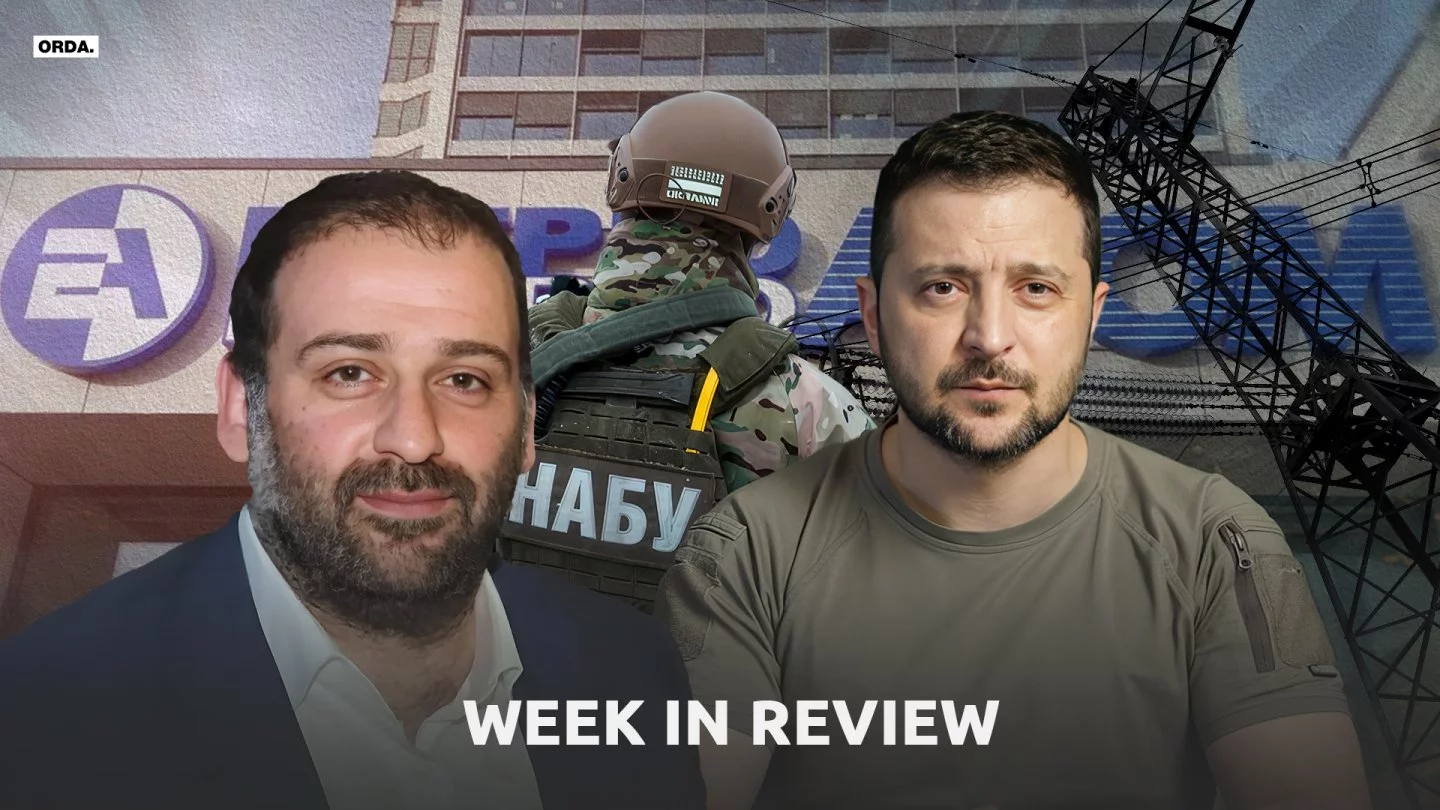
Orda.kz has put together a brief synopsis of last week's news. This edition focuses on a corruption scandal hitting Ukraine.
Allegations at Energoatom
Ukraine entered last week with a significant corruption scandal that might have drawn less attention were it not unfolding in the middle of Russia’s war.
The National Anti-Corruption Bureau (NABU) and the Specialized Anti-Corruption Prosecutor’s Office announced charges against eight individuals tied to a corruption scheme at the operator. Senior officials and long-time associates of President Volodymyr Zelenskyy have been mentioned.

The group faces accusations of bribery, abuse of office, and illicit enrichment.
The alleged organizer, Timur Mindich, reportedly fled Ukraine before charges were filed. Mindich is a longtime associate of President Zelenskyy and a co-owner of the Kvartal 95 production company.
The Ukrainian president transferred his stake in the main offshore entity after his 2019 election. However, Pandora Papers documents show that his wife, Olena Zelenska, remained the beneficiary of a company, Film Heritage, which was still eligible to receive dividends from the offshore network after 2019.
The offshore network itself was originally created as a financial and intellectual-property mechanism for Kvartal 95’s media business. It is unclear what most of the offshore network was used for.
However, the structure has been linked to two offshore real-estate purchases, one made by a Belize company, SHSN Limited, owned by Serhiy Shefir, a former presidential assistant.
Mindich is also a former business partner of Ukrainian oligarch Ihor Kolomoisky, arrested by the Security Service of Ukraine (SBU) on 2 September 2023 on charges of money laundering and fraud. Kolomoisky backed Zelenskyy's presidential campaign in 2019 and funded Ukraine's volunteer battalions against Russia's initial aggression in 2014.
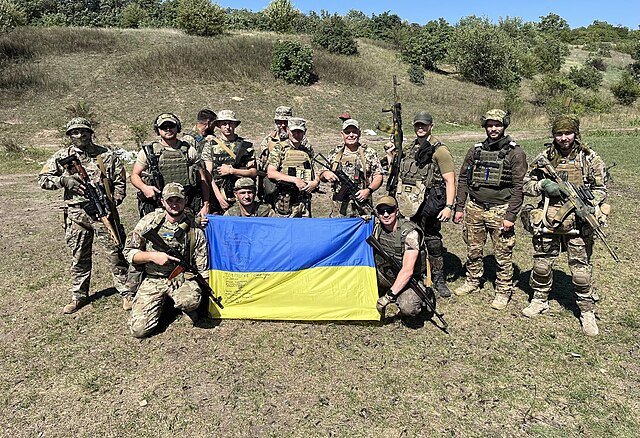
Photo: Kosmobomba, Creative Commons Attribution–ShareAlike 4.0 International.
Subsequent reports circulated that he was tipped off or that a potential leak occurred, as he fled the country four and a half hours before searches were conducted in his apartments.
Later, reports emerged that the deputy head of Ukraine's Special Anti-Corruption Prosecutor's Office, Andriy Synyuk, came under investigation, potentially over the above leak.
Recordings released by NABU reveal other suspects using code names such as “Karlsson” (Mindich), “Rocket” (former Energy Ministry adviser Ihor Myroniuk), and “Tenor” (former Energoatom official Dmytro Basov) as they allegedly discussed kickbacks linked to contracts with large-scale finances.
Myroniuk and Basov are said to have collected 10–15% kickbacks from contractors and funneled the proceeds through a back office operated by businessman Oleksandr Tsukerman, also wanted by U.S. authorities.
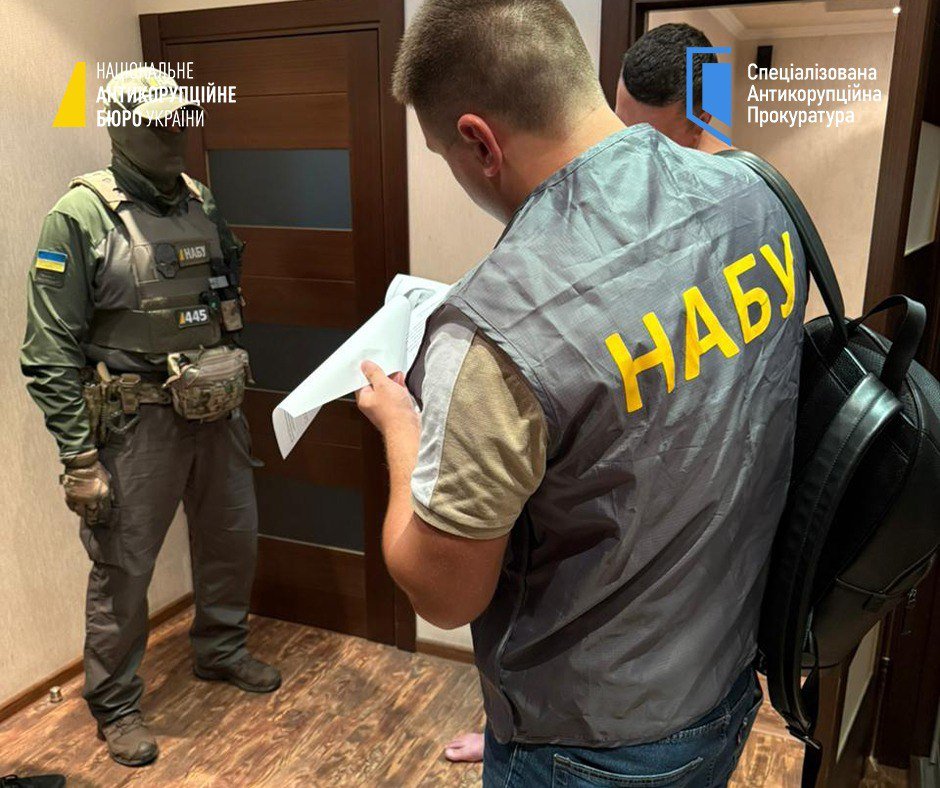
NABU authorities have claimed that Mindich oversaw these activities from the upper floor of a building on Hrushevsky Street — a potential reference to the building where both Mindich and Zelenskyy own apartments.
Five suspects have been detained; Mindich and Tsukerman remain at large.
Other Names
NABU also claimed that former Deputy Prime Minister Oleksiy Chernyshov received over $1.2 million and €100,000 in bribes. Former Justice Minister Herman Halushchenko and former Defense Minister Rustem Umerov were mentioned in NABU materials.
Halushchenko has not been formally charged, and Umerov has denied wrongdoing.
Umerov, Ukraine's National Security and Defense Council Secretary, has come under fire before.
While serving as defense minister, he faced an investigation into potential abuse of office over his decision to overrule a unanimous vote to extend director Maryna Bezrukova's contract as head of the Defence Procurement Agency.
Umerov was eventually reassigned, a move that coincided with claims he was undermining reforms. His predecessor, Oleksii Reznikov, also faced a similar outcome amid corruption scandals, though he was not personally accused of wrongdoing.
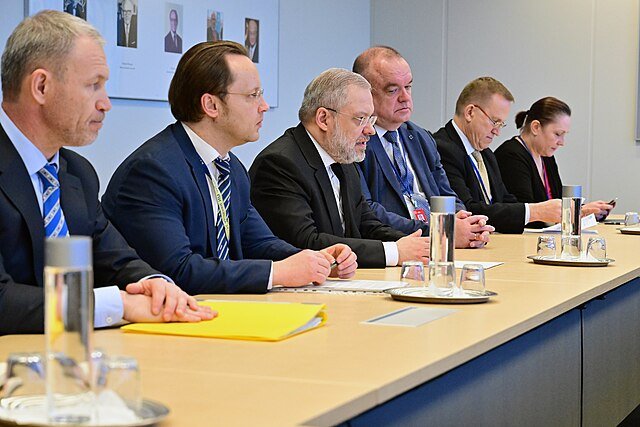
Resignations and Sanctions
On November 12, Prime Minister Yulia Svyrydenko announced that Justice Minister Halushchenko and Energy Minister Svitlana Hrynchuk had tendered their resignations. Halushchenko had been suspended earlier that day amid the investigation.
He wrote that stepping aside was “the right and civilized approach.”
Zelenskyy then requested sanctions against both Mindich and Tsukerman. Svyrydenko confirmed the government had initiated the sanctions process, which was awaiting final approval at the time.
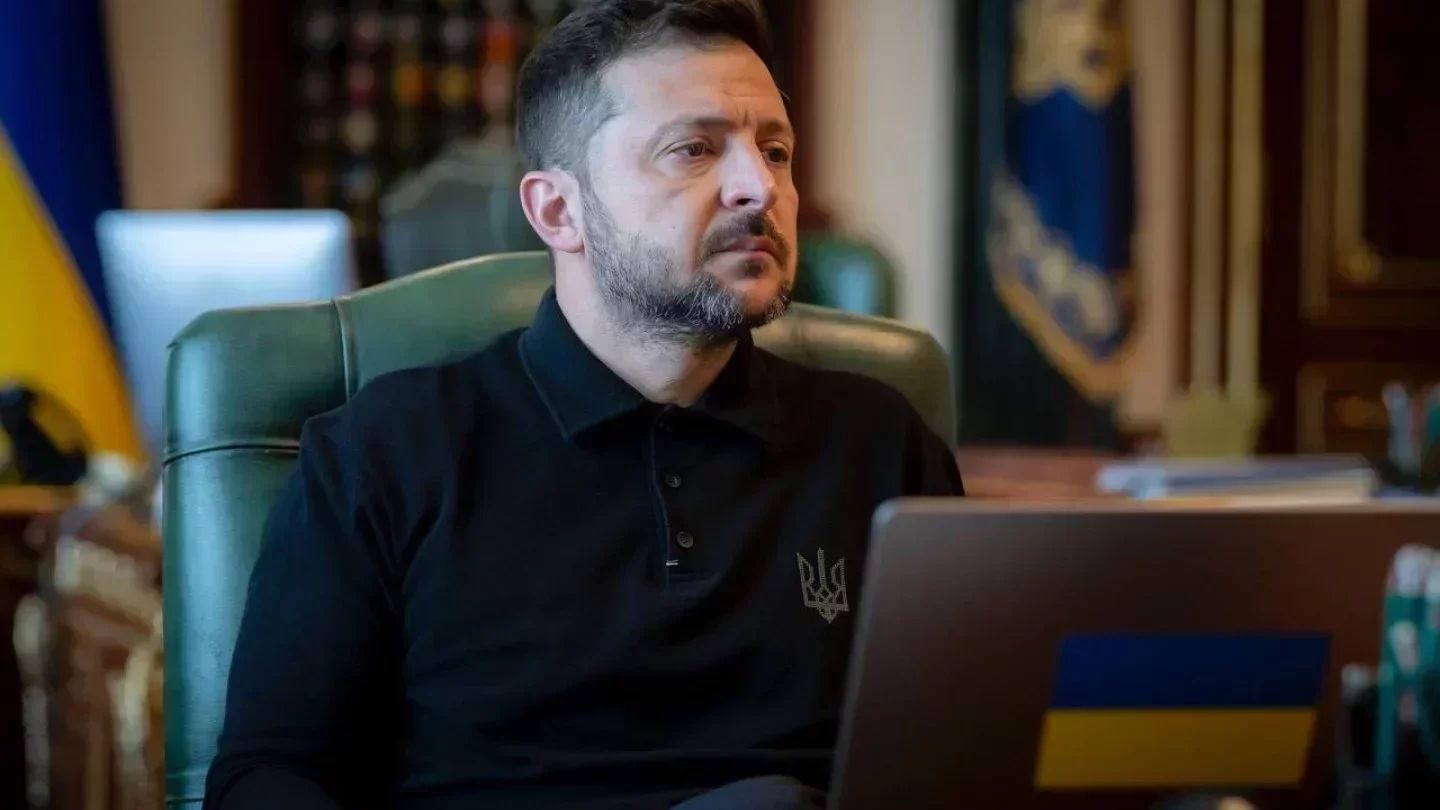
Meanwhile, information surfaced that Energy Minister Hrynchuk had spent several nights in Halushchenko’s apartment in recent months, a claim she denied knowing. Further allegations concern suspect Ihor Myroniuk's conducting of Hrynchuk’s job interview for the ministerial post.
The government also suspended Energoatom Vice President Jacob Hartmut based on NABU materials and dismissed the company’s supervisory board.
A Pattern?
The situation surrounding Energoatom does not appear isolated, fitting into a notable pattern.
Other figures implicated in corruption or ethics scandals:
- Oleh Tatarov, deputy head of the Presidential Office, was named in an earlier NABU bribery case that was later reassigned to a different law-enforcement body.
- Kyrylo Tymoshenko, another deputy head of the Presidential Office, resigned in 2023 after being found to be using vehicles donated for humanitarian purposes as personal transportation; he denied any wrongdoing.
- Denys Yermak, brother of Zelenskyy’s chief of staff, was previously accused of “selling” government positions, leading to significant controversy, though no conviction; Yermak claimed videos serving as evidence were taken out of context.
- Several deputy ministers in the energy sector were detained in 2023–2024 on corruption charges, deepening scrutiny of procurement networks in ministries connected to national infrastructure
At the same time, Timur Mindich's name previously emerged in another probe involving Fire Point — a firm producing drones and Ukraine's widely promoted Flamingo" cruise missiles. Concerns were that the firm misled the government on pricing and deliveries.
Wartime secrecy has made such contracts opaque.
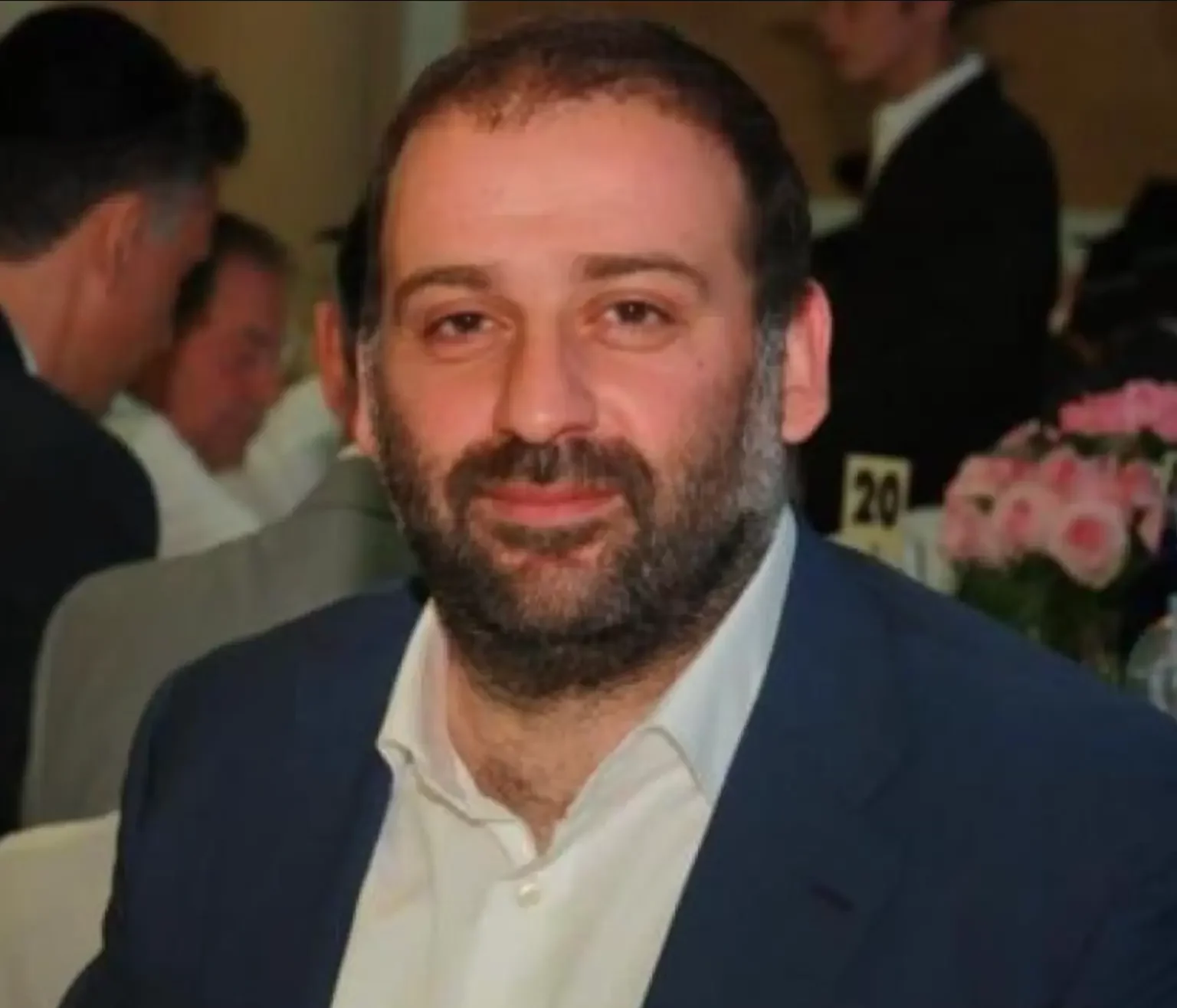
The Bottom Line
Such revelations may explain the reasoning behind Zelenskyy's signing of a law that stripped Ukraine's anti-corruption bodies of independence. Following the nationwide backlash, however, he quickly backed down.
At the same time, Volodmyr Kudrytskyi, Ukrenergo’s recently dismissed CEO, believes Zelenskyy has attempted to find scapegoats and shield political images via dismissals and sanctions. Kudrytskyi faces allegations he claims are politically motivated amid Ukraine's worsening energy situation intensified by Russia's ruthless bombardments targeting an energy system in need of further fortification.
Such circumstances can fuel distrust.
However, one must distinguish between officials under scrutiny and the public they represent.
Ukraine mobilized when the bodies investigating corruption came under fire, forcing officials to retreat.
Regarding Zelenksyy, he is unlikely to face a probe during the war, though the blow against his allies, and by extension, him, is irreparable. Umerov, involved in high-level negotiations with Russia, could also emerge largely unscathed.
Still, this is a deduction from a legal standpoint, and the reasoning is political, given Russian disinformation campaigns. When Zelenskyy seeks to secure a subsequent presidential term, these ties will resurface as liabilities for him and everyone involved.
The longevity of any political figure's mandate rests with the public, and Zelenskyy at one point was still polling with a 67% approval rate. Ukraine's people may opt to perceive the current circumstances as wartime reality, as peace and sovereignty remain the ultimate goal.
A July poll revealed that 69% say they favor a negotiated end to the war as soon as possible, with 24% supporting continuing to fight until victory.
Another poll showed the majority opposed territorial concessions.
Wartime expectations shape political tolerance, but they do not erase it. The scandal may reshape the political landscape for Zelenskyy, yet this depends on how far the investigation goes.
Internal actors, namely Zelenskyy’s influential chief of staff, Andriy Yermak, might pose a challenge to its progression.
Yermak has ties spanning throughout Ukraine, including law enforcement.
The investigations could still amplify the push for reforms — Ukrainians' calls for accountability, boosted by external pressure, can serve as the driver for their implementation.
Indeed, Zelenskyy has already committed to reforms of the state energy system, much like he backtracked under pressure to maintain corruption bodies' independence.
If pushback reemerges, then those trying to stall change will come under intense scrutiny. And while even the media has come under pressure, critical voices continue to surface.
All of the above are indicators of a society striving for democratic oversight in the middle of war. Whether officials respond to that pressure is a question only their actions can answer.
Latest news
- Damaged Baikonur Launch Pad Facility Restored After 2025 Collapse
- A Rare Black Melanist Wolf Was Shot in Eastern Kazakhstan
- Kazakhstan Maintains Neutral Stance on Middle East Escalation
- Kazakh MFA: Citizens Evacuated from the Middle East via Oman and Saudi Arabia
- Kazakhstan to Spend 4.6 Trillion Tenge on Road Projects Through 2029
- Central Asia Competes for the Skies: Why Kazakhstan Risks Falling Behind Uzbekistan on Jet Fuel
- The War in Iran Opens a Window of Opportunity for Kazakhstan’s Oil Sector, Analysts Say
- Iran Conflict Escalates Beyond the Gulf: What Kazakh Experts Say About Risks for Central Asia and Kazakhstan
- Kazakhstan Prepares Possible Evacuation of Its Citizens From Iran
- LRT in Astana Is Reaching the Finish Line: The Launch Is Expected in the Coming Months
- Kazakhstan Ready to Help the UAE Amid Escalation in the Region
- Tokayev Discusses Middle East Escalation With Qatar’s Emir
- Airlines Ready to Bring Kazakhstanis Home From the Middle East
- Tokayev Sends Support Messages to Gulf Leaders Amid Regional Escalation
- Kazakhstan Bans Its Airlines From Flying Over Several Middle East Countries
- Astana Strengthens Security Measures Amid Escalation Around Iran
- Tokayev Meets U.S. Ambassador Stufft, Discusses Board of Peace Cooperation
- Mangystau Launches AI-Assisted School Monitoring to Prevent Teen Suicidal Behavior
- Kazakhstan to Supply UK With Critical Minerals
- AI Faculties for Educators to Open in Kazakhstan: What Other Changes Are Coming to the Education Sector

